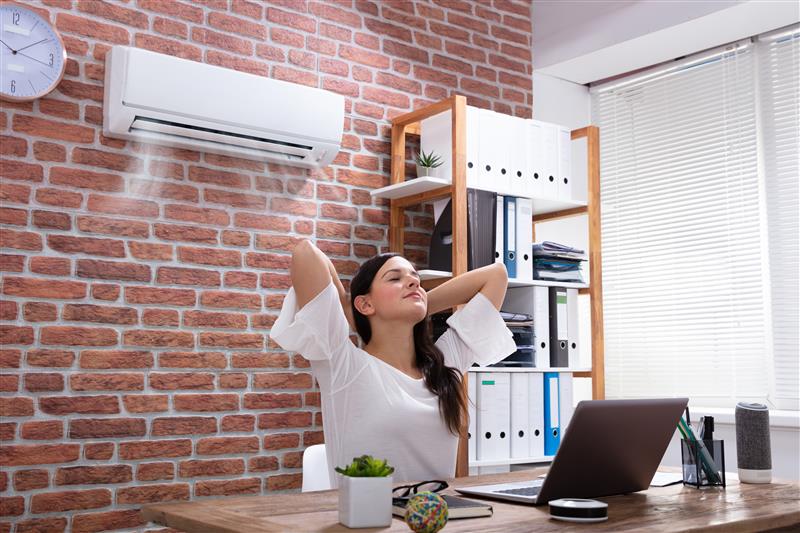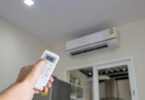In today’s fast-paced, productivity-driven work environments, employers are always looking for ways to boost employee output, comfort and well-being. Technology, leadership and workplace culture get a lot of attention in these discussions but one physical factor gets overlooked: temperature control.
Air conditioning plays a bigger role in workplace performance than we realise. From reducing fatigue to improving concentration, a well-maintained cooling system can make us feel—and work—better.

The temperature-performance link
Studies have shown that room temperature directly affects mental alertness, mood and cognitive performance. A space that’s too warm or too cold can quickly become uncomfortable, distracting and unproductive.
Experts agree the optimal indoor temperature for office work is between 20°C and 26°C. Sticking to this range allows us to focus on the task without the constant distraction of physical discomfort.
Cognitive clarity
One way air conditioning helps us perform is by supporting cognitive clarity. Our brain function is sensitive to changes in core body temperature. In warmer environments, the body works harder to cool itself, diverting blood flow from the brain to the skin. This can reduce mental capacity, especially for tasks that require deep thinking or decision making.
Cool, stable indoor temperatures help maintain a comfortable internal environment, allowing us to concentrate for longer and perform complex tasks more efficiently. Whether it’s solving problems, managing spreadsheets or creative work, the ability to think clearly is key.
Reduced fatigue and fewer mistakes
Heat can be exhausting, especially in open-plan offices or environments with poor ventilation. Without adequate cooling, we may feel drowsy, suffer from headaches or even mild dehydration, all of which reduce focus and accuracy. Air conditioning reduces thermal stress, so we expend less energy trying to stay cool. The result? Employees feel more energised throughout the day and are less likely to make mistakes due to heat-induced fatigue. In customer-facing industries or workplaces with machinery, even small errors can be costly or dangerous. In this context, a comfortable temperature isn’t just about productivity—it’s about safety and professionalism.
Morale and workplace satisfaction
Comfortable workspaces lead to happier workers. When employees feel their needs are being met, including something as simple as ambient temperature, it boosts morale. A hot and stuffy office can create tension, complaints and even conflict among colleagues.
A well-cooled environment shows an employer values their team’s comfort and helps to foster a more positive workplace culture. Staff who feel looked after are more likely to stay engaged, collaborative and loyal.
Shared discomfort (like sweating through a heatwave with no relief) can become a daily irritant and gradually erode team spirit and employee satisfaction.

Other benefits of air conditioning in the workplace
From improving employee health to boosting productivity and managing energy costs, a well-maintained climate control system can bring a range of year-round benefits to any workplace.
Better air quality and health benefits
Modern air conditioning systems do more than just regulate temperature; they also improve indoor air quality by filtering out dust, allergens and pollutants. For people with asthma, hay fever or respiratory conditions, this can be life changing.
Good air quality means fewer sick days, fewer health complaints and more energy overall. In hot weather, air conditioning reduces the risk of heat-related illnesses, such as heatstroke and dehydration, especially in vulnerable employees.
“We recommend getting your air conditioner serviced every six months”, says Metropolitan Heating and Cooling Technicians. Regular servicing of HVAC systems ensures filters are clean and functioning correctly – crucial for avoiding stale air or circulating allergens.
Seasonal stability and rear-round performance
One of the benefits of investing in reverse cycle air conditioning (a popular option in Australia) is the ability to control both heating and cooling within the same system. This means year round climate stability so employees are comfortable in both winter and summer.
Consistency in the work environment supports better daily routines and fewer performance dips caused by seasonal temperature extremes. It also simplifies energy planning and facility management for employers.
Energy efficiency and cost
Modern air conditioning systems are far more energy efficient than older models. With smart thermostats, zoning systems and eco friendly designs it’s possible to maintain employee comfort without increasing energy costs.Organisations can manage costs while still getting the benefits. This includes:
- Setting thermostats between 23–24°C in summer.
- Using programmable timers or sensors to reduce cooling in unused areas.* Regular maintenance for optimal performance.
In Australia the Department of Climate Change, Energy, the Environment and Water has guidance on energy efficient workplace cooling and commercial upgrade incentives through state based programs.
Remote work and home office benefits
Air conditioning isn’t just for corporate offices. With more Australians working from home, individuals are finding that having a cool, quiet space at home helps them stay focused and well during long hours.
Small split systems or portable air conditioners can turn a spare bedroom or home office into a more productive space, especially during the Australian summer.
Conclusion
Air conditioning might not be the first thing that comes to mind when evaluating workplace performance but it has a measurable impact on employee productivity, well being and overall satisfaction. By keeping the indoor temperature optimal employers can improve focus, reduce fatigue and create a more positive and energetic work environment.
In a climate like Australia’s—where summer temperatures can get hot and humidity high — a good air conditioning system isn’t a luxury. It’s a business investment in your people.
“The opinions expressed by BizWitty Contributors are their own, not those of BizCover and should not be relied upon in place of appropriate professional advice. Please read our full disclaimer."







